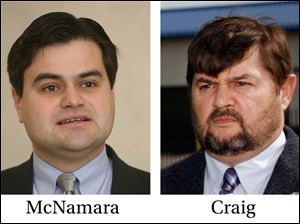
Support builds for domestic partner benefits
Majority on city council plans to OK legislation next week
5/31/2012
City Council President Joe McNamara, left, and Councilman Mike Craig, right.
A proposal to extend health care and other benefits to the domestic partners of city employees has garnered the support of a majority of Toledo City Council members and is expected to be approved by the panel next week.
Seven out of 12 councilmen said Wednesday they plan to vote in favor of the bill, which would extend benefits to both same-sex and heterosexual couples.
Their statements followed a two-hour public hearing, which included impassioned testimony from more than a dozen city employees, gay-rights activists, and other city residents. All but two speakers expressed support for the plan.
“I thought it was one of the most moving council meetings I’ve ever been to,” said council President Joe McNamara, one of the seven members who said they will vote for the legislation. “It puts faces to the families that this legislation is designed to help.”
Council split largely along party lines in favoring the proposal, with only one Democratic member, Tyrone Riley, remaining on the fence. Those in support of the legislation, introduced by Toledo Mayor Mike Bell, cited a need for fairness and equality in how the city treats its employees, and pointed to other major cities in Ohio that have enacted similar policies.
Instead of a marriage certificate, employees in domestic partnerships would have to prove they are registered with the city's voluntary Domestic Partner Registry.
While the city is unsure exactly what the policy change could cost, Human Resources director Ellen Grachek said a maximum of 2 percent of the city's work force — or 42 people — are expected to enroll.
That would cost Toledo $410,000 a year in additional health premiums, she said.
“We’re just trying to be fair to people who are living together as a family. And as far as costs go, what about the employees out there who have two families and they’re responsible for medical on both of them?” East Toledo Councilman Mike Craig said.
But three councilmen — Mr. Riley, Republican George Sarantou, and independent D. Michael Collins — said they remained undecided. Republicans Rob Ludeman and Tom Waniewski expressed strong opposition. Most of the concerns centered around the cost of adding more people to the city’s health-care plan.
Mr. Riley said he wants more reassurance from the Bell administration that the policy won’t be too expensive and that adequate procedures will be in place to prevent fraud before he votes for the measure.
Mr. Waniewski went a step further and called the legislation an invitation for “massive fleecing” of taxpayer money.
He said employees potentially could obtain domestic partner benefits for someone they are not really in a relationship with, or could continue to receive the benefits after the relationship ends.
Human Resources Director Ellen Grachek said it is no more likely that domestic partners would obtain benefits improperly than married couples. She said the city conducts periodic audits to ensure employees only receive the benefits for which they and their families are eligible.
Instead of a marriage certificate, employees in domestic partnerships would have to prove they are registered with the city’s voluntary Domestic Partner Registry.
While the city is unsure exactly what the policy change could cost, Ms. Grachek said a maximum of 2 percent of the city’s work force — or 42 people — are expected to enroll. That would cost Toledo $410,000 a year in additional health premiums, she said. However, based on the experiences of other entities with similar policies, that number could be far less.
Councilman Steven Steel indicated the cost of providing health care is unpredictable even under the existing system, because it’s impossible to know how many new dependents an employee will add or remove in a given year.
“No one on council seems concerned about the unpredictability of all of the other benefits,” he said. “A lot of these arguments seem nonsensical to me.”
Councilmen Ludeman, Sarantou, and Collins also slammed the Bell administration for not bringing up the issue of domestic partner benefits during recent collective-bargaining negotiations.
Their concerns were echoed by Don Czerniak, president of the city’s service workers’ union, AFSCME Local 7, who said he fears the cost of extending health benefits to domestic partners will be pushed along to his members.
Most speakers at the hearing applauded the legislation, however, including several firefighters.
Angela Webber, 33, who has been in a same-sex partnership with a Toledo firefighter for 11 years, said her inability to obtain health-care benefits through the city is unfair and a strain on her family.
Ms. Webber, a recent nursing graduate, is pregnant with her second child and fears the baby could be born after her student health plan expires in August.
“It’s very stressful,” she said. “Anybody could be married and extend benefits to their new spouse, but it’s not an option for our family.”
Louis Escobar, a former city council president who is openly gay, denounced council’s need to even question the benefit extension.
“I am not different from any of you, and to try to use cost as an issue for something that I have a right to is abominable,” he said. “We are American citizens. ... It is your moral obligation to set these things right.”
Contact Claudia Boyd-Barrett at: cbarrett@theblade.com or 419-724-6272.